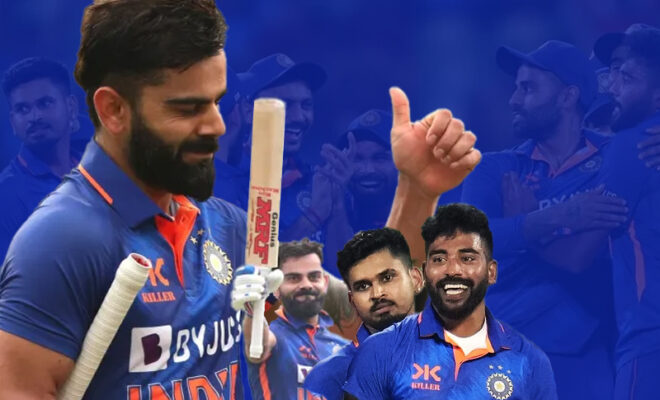Team India Registers Huge Records With Victory Over Sri Lanka

As Team India defeated Sri Lanka by a staggering 317 runs in the third and final ODI to secure the series sweep. There were multiple records broken after the match.
Records were broken on Sunday when Team India defeated Sri Lanka by a huge margin of 317 runs in the 3rd and final ODI to secure the series sweep.
The Men-in-Blue held the Lions to just 73 runs after amassing an impressive total of 390 runs in the first innings.
The Rohit Sharma-led team not only scored this enormous victory but also set a tremendous record.
Several individual records were established, but the one team record that sticks out the most is the size of the victory margin.
Keep Reading
The Men in Blue’s 317-run victory over the Lions surpassed New Zealand’s 290-run victory margin against Ireland in 2008 as the largest winning margin in ODI cricket history.
Star Indian batsman Virat Kohli etched his name into the annals of individual records with two distinct records to his credit after his scorching performance of 166 runs off just 110 balls.
The 34-year-old scored his 21st century in India, passing famous batsman Sachin Tendulkar (20) for the record for the most centuries scored in a nation.
In addition, Kohli now owns the record for most centuries against one nation. Against Sri Lanka, the former Indian skipper has already scored 10 tonnes. With 900s each against the same nation, Kohli and Tendulkar previously shared the record.
Kohli seems to like battling against the West Indies and Australia as well, having hit nine and eight ODI hundreds against each nation, in addition to his astounding performances against Sri Lanka.
Ravichandran Ashwin, an Indian off-spinner, discussed the dew element in his most recent YouTube video when playing cricket in India.
For teams to avoid the dew issue at the ICC Men’s ODI World Cup, which will be played later this year, Ashwin offered a suggestion.
Ashwin said, “My suggestion – or rather my opinion – for the World Cup is to look at what venues we are playing in, and at what times. Why shouldn’t we start matches at 11.30 am during the World Cup?”
The dew effect is important during day/night matches in the subcontinent, as teams chasing targets usually have an advantage.



